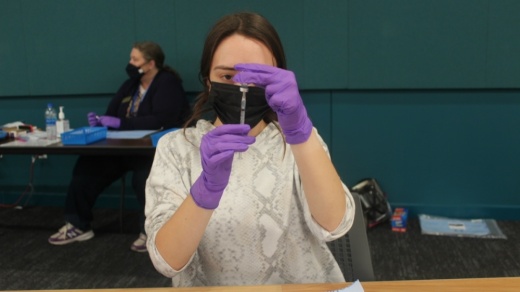The FDA amended the emergency use authorizations for the Pfizer and Moderna vaccines Aug. 13 to allow certain high-risk individuals to receive a third dose. While the mRNA vaccines were initially authorized as a two-dose regimen, the FDA said some immunocompromised individuals could benefit from the added immunity offered by a third shot.
“The country has entered yet another wave of the COVID-19 pandemic, and the FDA is especially cognizant that immunocompromised people are particularly at risk for severe disease. After a thorough review of the available data, the FDA determined that this small, vulnerable group may benefit from a third dose of the Pfizer-BioNTech or Moderna vaccines,” said Dr. Janet Woodcock, acting FDA commissioner, in a statement.
Booster shots for the Johnson & Johnson vaccine were not recommended.
In Austin, vaccine providers are ready to administer booster shots to eligible patients, APH leaders said at a joint meeting of Austin City Council and the Travis County Commissioners Court.
"We're really directing our public to talk with your health care provider to determine if an additional dose is appropriate," said Adrienne Stirrup, interim director of Austin Public Health. "If you do not have a regular provider or cannot find a site to get vaccines, APH expects within the next few weeks to set up a program to offer boosters to the community."
Those who are recommended to get an additional shot, according to APH, include people in treatment for tumors and blood cancers, people taking immunosuppressant drugs following organ transplants, people who have advanced or untreated HIV, people with immunocompromising medical disorders, people with certain chronic medical conditions and dialysis patients, among others.
The World Health Organization has called for a moratorium on the distribution of booster shots among the general population until at least the end of September so that the global community can focus on redirected vaccine supplied to countries with low vaccination rates. In an Aug. 10 report, the WHO said boosters should be targeted "to the population groups in the greatest need" when distributed.
However, Pfizer announced Aug. 16 it had submitted data to the FDA supporting the authorization of third doses for the general public six to 12 months after receiving a second.
"With the continuing threat of the delta variant and possible emergence of other variants in the future, we must remain vigilant against this highly contagious virus,” Pfizer CEO Albert Bourla said in a statement. “The data we’ve seen to date suggest a third dose of our vaccine elicits antibody levels that significantly exceed those seen after the two-dose primary schedule. "





